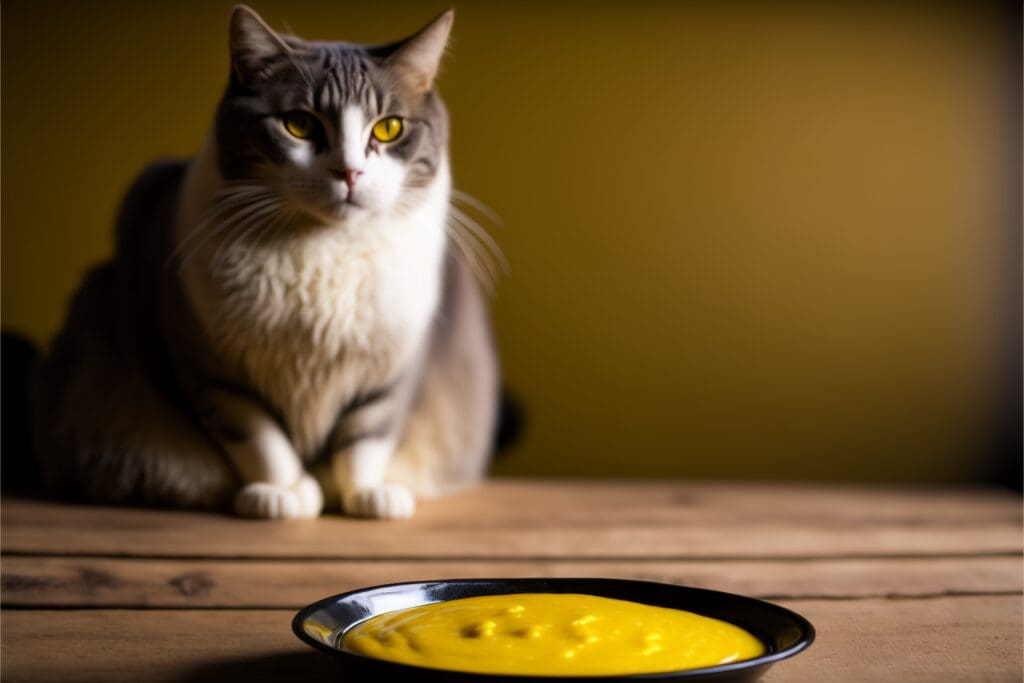Last Updated on January 8, 2023 by admin
The quick answer is no, cats should not consume mustard. Cats are not designed to eat the same food as humans, and mustard is no exception. Mustard is high in sodium, which can be dangerous for cats as they need to maintain a specific salt balance in their bodies. Ingesting the mustard seeds is dangerous for cats and can cause a number of negative health issues, such as digestive upset, abdominal pain, and even vomiting and diarrhea. So, the best thing to do is to keep them away from any mustard-based meals.
The Benefits and Risks of Feeding Mustard to Cats
No doubt, there are a few potential benefits to feeding mustard to cats in certain circumstances. Mustard can help cats gain weight, and it can also help to reduce inflammation and pain in cats with arthritis. However, the risks associated with feeding mustard to cats are high, and it’s important for pet owners to understand them before making the decision to feed their cats this condiment.
What Do Veterinary Professionals Say About Feeding Mustard to Cats?
Veterinarians typically advise against feeding mustard to cats due to the potential risks it poses. While mustard does provide some health benefits for humans, cats should not eat mustard because it can cause gastrointestinal complications, such as vomiting and diarrhea. Moreover, the mustard seeds can be dangerous for cats to ingest and may lead to a number of negative health issues. Ultimately, it is best to keep mustard away from your feline friend.
Signs of Mustard Allergy in Cats
It’s important to be aware of the signs of a mustard allergy in cats, as ingesting the condiment can cause an allergic reaction in some felines. Cats with an allergy to mustard will typically display signs such as vomiting, abdominal pain, diarrhea, and excessive scratching. If you notice any of these symptoms, it’s important to bring your cat to the vet for a diagnosis and treatment.
Why Is Mustard Bad for Cats?
Mustard is not recommended for cats as it can be dangerous. Mustard seeds contain a compound known as isothiocyanate which is toxic to cats and can cause a range of gastrointestinal issues such as vomiting, diarrhea, and dehydration. Additionally, mustard can cause severe allergic reactions in cats, which can lead to anaphylactic shock. As such, it is important for pet owners to be aware of the potential risks associated with feeding their cats mustard.
Can Cats Have Mustard?
When it comes to feeding mustard to cats, the general consensus is that cats should not have access to this condiment just like ketchup. Mustard seeds are known to cause severe gastrointestinal complications including vomiting and diarrhea in felines. Additionally, mustard can also cause an allergic reaction in some cats. It is important to note that even though mustard is not necessarily toxic to cats, it is still not a good idea to let them eat it as it can cause digestive issues. If your pet has stolen a hotdog with some mustard on it, it’s generally fine for them to have a lick or two. However, it’s best to avoid feeding them too much mustard as this can lead to serious health issues.
Can Cats Eat Mustard Greens
When it comes to mustard greens, the answer is still no. Mustard greens have a high content of oxalates which can cause kidney stones. Cats are especially prone to this condition, so feeding them mustard greens can be very dangerous. Plus, the spicy flavor of mustard greens can cause indigestion in cats and make them sick. For these reasons, it’s best to keep mustard greens away from your feline friend.
Is Mustard Ok for Cats
The answer is no. Mustard is not safe for cats and can be dangerous to their health. Mustard seeds, which are a component of the condiment, can cause severe gastroenteritis in cats characterized by persistent vomiting and/or diarrhea. In addition, cats may develop an allergic reaction to mustard which can lead to further complications. It is best to keep mustard away from cats and avoid feeding it to them altogether. If your pet does accidentally consume mustard, then it is important to keep an eye out for any signs of an allergic reaction or other symptoms of gastrointestinal distress.
Dangers of Feeding Too Much Mustard to Cats
If cats consume too much mustard, it can cause some severe gastrointestinal complications which may lead to vomiting and diarrhea. It’s important to keep in mind that cats don’t naturally like the taste of mustard and it’s unlikely that they’ll eat large quantities of it. Therefore, it’s important to keep mustard out of your cat’s reach and to ensure that they cannot access it. Additionally, if your cat experiences any of the signs of a mustard allergy mentioned above, it’s best to take them to the vet for an examination.
